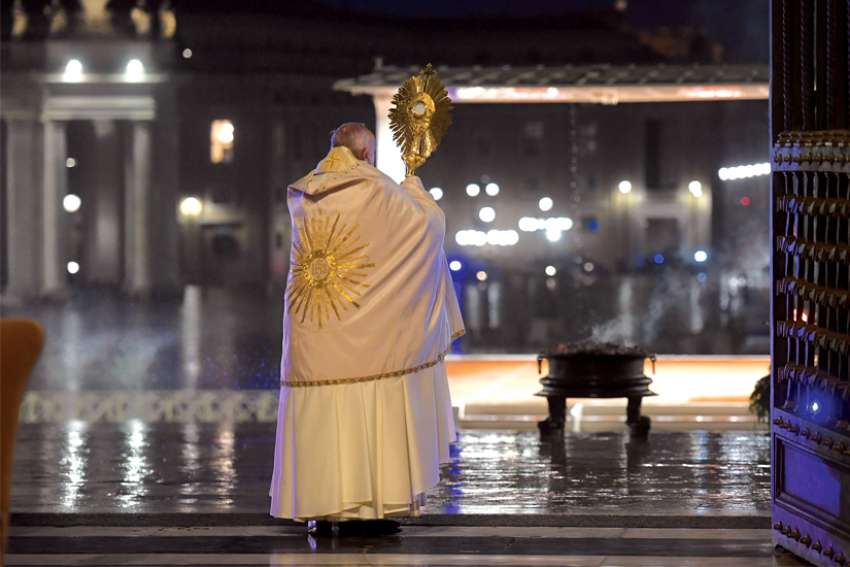A priest apart from the sacraments is an absurdity, even a contradiction in terms. A priest apart from the sacraments may do many good things, but he is missing something essential.
So what is a priest to do in a pandemic? He is to do his utmost to celebrate the sacraments. A priest who lays aside the sacraments during a pandemic would be like a doctor who lays aside medicine, or a police officer who lays aside public order.
“As clergy we must take seriously the recommendations of health experts and the government,” wrote Archbishop Michael Mulhall to all of us Kingston priests.
“Nevertheless, the role of the Church is the salvation of souls. In times of crisis the Church has always been there to strengthen the faith, hope and love of people, nourish their spiritual lives, and through prayer and worship implore divine assistance to aid the efforts of scientists and researchers to find a cure and restore a normalcy to society.”
That’s remembering the “priority of the spiritual life,” as Archbishop Mulhall began his letter to us. The spiritual life always takes priority of course, but in the anxiety over a pandemic it’s possible even for bishops and priests to fear that which can kill the body but not the soul, even though Jesus was explicit that we should not fear that but rather the one who can kill the body and the soul (cf. Matthew 10:28). I was thus grateful to the archbishop for that timely reminder.
So what should we priests be doing when public gatherings are prohibited, and even our churches are closed?
We continue the sacramental life of the Church as best as we are able to do.
Priests are offering the Holy Mass privately. That’s obviously not ideal, but only two weeks into the state of emergency we need to be patient. A state of emergency is just that — things are done on an emergency basis, meaning without an abundance of time to think through every aspect and consider every option.
For example, it’s obvious that the daily press briefings of the premiers and chief medical officers, with colleagues and reporters and cameramen not far away, are more dangerous than it would be to admit a symbolic few — 12 perhaps in a large church? — parishioners to a daily Mass where they would never need be closer than 25 metres from the altar.
Every grocery store and pharmacy in the province is more dangerous than people sitting quietly — 10 metres apart, not moving — in a large church for Eucharistic Adoration. In my parish of Sacred Heart of Mary on Wolfe Island, my church is the largest indoor space on the island; it’s safer for small numbers to be there than the post office, the corner store or the take-out restaurant.
Yes, it’s true that a closed church with no one in it is safer than an open one with a few people in it. But it’s also true that a closed liquor store is safer than an open one, and a closed grocery store is safer than an open one. Some things are considered essential, and some things are not. That houses of worship have not been considered essential is a moment of great cultural clarity.
In due course, we can hope that more sensible and flexible restrictions will be implemented. In the meantime, we are patient and do our best to make the sacraments available.
Last Sunday, with the church closed, I put the monstrance with the Most Blessed Sacrament in the window of the parish office, so people could at least be in the sacramental presence of the Lord Jesus on the Lord’s Day. I, as the only one in the office, prayed inside, while the people prayed outside without having to leave their cars.
It was not ideal, but the faith of the people who came in the rain confirmed what Catholics already know in their spiritual bones: We cannot live without the sacraments.
Confessions require more creativity still, as our confessionals are off-limits. Before the restrictions became more severe, I first heard confessions in our daily Mass chapel where we could keep more than three metres apart. After the churches were closed, I heard confessions in a chilly garage. Now the archdiocese has decided that confessions should be outdoors, so I will hear them outdoors.
The alternative — not hearing confessions at all — is not an option, any more than a nurse not treating a patient sick with the coronavirus would be an option. Priests act in persona Christi, in the person of Christ, the Divine Physician. We should remember that He, too, is a front-line worker.
Our guidelines in Kingston clarify that the Sacrament of the Sick and Viaticum for the dying will continue with proper health precautions taken. The faithful would find it mightily strange if a priest abandoned the Anointing of the Sick during a time of widespread sickness!
This pandemic will pass, and before then, some of the more severe emergency measures will be adapted. In the meantime, I am inspired by my brother priests who recognize the primacy of the spiritual and who do not abandon the sacraments. I am grateful too for my archbishop making the same clear to all.
(Fr. de Souza is editor-in-chief at Convivium.ca and a pastor in the Archdiocese of Kingston.)

